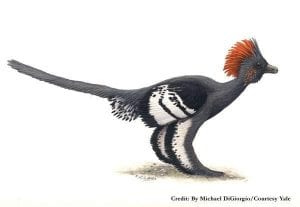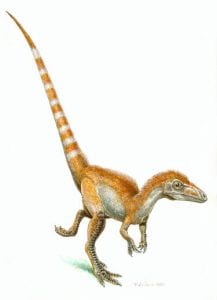Dinosaur feathers and colour – Dinosaurs had feathers and we can tell their colour. This site outlines all the work in the Bristol Palaeobiology Research Group about the evolution of feathers, their colours, functions, and exceptional preservation. (original) (raw)
News flash (January 2020): The Smithsonian Institution (Washington, DC) has surveyed all the great science done around the world from 2010-2019, and they identified our work on discovering the colour of dinosaurs as one of their Top-Ten Discoveries of the Decade. They identify four publications, from 2010 onwards, by Bristol palaeobiologists Jakob Vinther and Mike Benton as leading the field. Read more….
Until the 1990s, the origin of feathers and dinosaur thermoregulation were highly debated. Famously, Archaeopteryx was the world’s oldest bird, the first animal with feathers preserved, and it was evidently a derived theropod dinosaur. Then, in 1996, the compsognathid dinosaur Sinosauropteryx was reported from the Jehol Group of China, with ‘protofeathers’ preserved. After that, more and more theropod dinosaurs from China were reported with feathers. But did other dinosaurs have feathers, and why did feathers evolve?
We have worked on these questions in the Bristol Palaeobiology Research Group since 2005. The first discovery, in 2008, was that ancient feathers contained melanosomes, the capsules in feathers and hair that contain the pigment melanin. This led to two reports of the original colour of dinosaurs in 2010, one for Sinosauropteryx and the other for Anchiornis. Theropod dinosaurs close to the origin of birds had a diversity of feathers and these feathers were richly coloured and patterned.
 Further work concentrates on feather preservation, feather function, and feather evolution.
Further work concentrates on feather preservation, feather function, and feather evolution.
There has been debate about how well ancient feathers can be preserved, and whether the organic chemicals are original. First, it has been shown that the pigment melanin survives for millions of years and the ancient form matches experimental degradation experiments. Whether the feather keratin survives is debated. Skin can survive as flakes – dinosaur dandruff. A tiny dinosaur tail, with feathers, was even found in amber in 2016.
What did dinosaurs use their feathers for? It was long assumed that insulation came first, then flight. New discoveries confirm that. But it was surprising to find that the theropod dinosaurs Anchiornis and Sinosauroptyeryx showed sharp stripes and patches of colour – they were already using their feathers for display. New in 2016 was the discovery that several dinosaurs at least also showed countershading – part of a camouflage system.
When did feathers evolve? At first, it was thought only certain derived theropods, close to birds, had feathers. Then, ornithischians such as Tianyulong and Psittacosaurus were found to show feather-like structures, and in 2014, an ornithischian dinosaur with diverse feathers, Kulindadromeus, was reported. Perhaps, we suggested, all dinosaurs had feathers? Then, in 2019, pterosaurs with four kinds of dermal structures, some showing branching, were reported. Were these feathers, and if so, did feathers then originate 80 Myr earlier than thought, at the root of the common ancestor of dinosaurs and pterosaurs, some 250 Myr ago, in the Early Triassic?